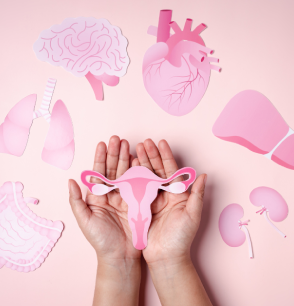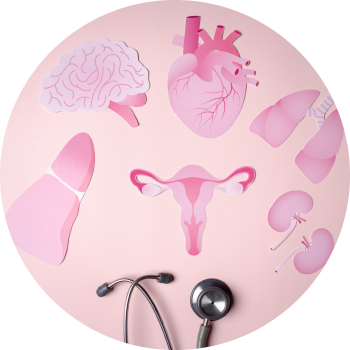Hormones are part of an intricate communication system in the body that plays a role in so many aspects of health. If they are not produced, regulated, or metabolized properly, women can experience undesirable symptoms. While these symptoms may be common, this does not necessarily mean normal. Naturopathic medicine aims to identify and address the reason for the hormonal symptoms and conditions that so many women struggle with. This root-cause approach provides more sustainable solutions to regulating cycles and hormones rather than relying on the birth control pill.
Conditions Treated
- Irregular periods
- PMS
- PCOS
- Endometriosis
- Uterine fibroids
- Fertility
- Pregnancy & postpartum
- Menopause
- Thyroid
Individualized treatment is offered for patients since everyone experiences symptoms in a unique way. A combination of therapies is often used including botanical medicine, nutritional supplements, diet and lifestyle counseling, Traditional Chinese Medicine (TCM) and acupuncture, and more. Naturopathic treatment can help with the following:

- Menstrual cycles: relieve PMS symptoms, reduce pain & cramps, regulate cycles and flow, promote healthy mood, support healthy hormone production & metabolism
- Gynecological conditions: reduce chronic pain, reduce risk of estrogen-related cancers, reduce inflammation, address associated symptoms such as insulin resistance
- Fertility: improve egg quality, optimize health and nutritional status for conception, support healthy sperm production and quality in men, reduce the risk of miscarriage
- Pregnancy & postpartum: reduce pregnancy nausea, promote optimal nutrient intake, support labor and delivery, promote breast milk production
- Menopause: promote proper thyroid function, improve energy levels & libido, alleviate stress, anxiety and mood changes, support healthy bone density, reduce risk of cardiovascular disease
Comprehensive lab testing is also available to check for hormone function, nutrient levels, metabolic status, thyroid health, gut health and more. Testing is a great tool to help find the underlying cause of symptoms and guide treatment.
Frequently Asked Questions
The menstrual cycle follows a specific pattern of hormonal events every month. Many factors can influence hormones causing this pattern to become irregular and unpredictable. Some causes of this include changes in hormone levels, excessive exercise, thyroid conditions, endometriosis, PCOS, significant weight changes, stress, certain medications, and perimenopause.
A thorough clinical intake, lab testing and ultrasound imaging can provide the necessary information to make a PCOS diagnosis.
The Rotterdam criteria is used to make a diagnosis, and is positive for PCOS if at least 2 of the following 3 criteria are present:
- Irregular (or absence of) menstrual periods
- High androgen levels – assessed through clinical signs & symptoms, or through hormone testing in the blood or urine
- Polycystic ovaries – measured by ultrasound for number and size of follicles, and volume of ovaries
Menopause is a natural transition during a woman’s life that is associated with a change in hormones. While this process can’t be avoided, there is definitely a lot of support that naturopathic medicine can offer. While menopausal symptoms are common, they shouldn’t be unbearable and affect your day-to-day functioning and quality of life. Naturopathic treatments can address and alleviate menopausal symptoms either alongside medication or to prevent the need for medication.
Managing symptoms of PMS first involves identifying and addressing the underlying cause. This can be achieved through a comprehensive clinical intake and lab testing. Depending on the cause, various treatment options are available including botanical therapy, Traditional Chinese Medicine (TCM), acupuncture, diet and lifestyle counseling, nutritional supplements, and more.
Several options are available for assessing hormonal status and function. Testing is usually done on specific days of the menstrual cycle. Blood testing and dried urine testing (such as the DUTCH test) are two of the most common methods of evaluation. Electrodermal screening (EAV) is another method that is offered in-clinic.
Common signs and symptoms of hypothyroidism include:
- Difficulty losing weight
- Feeling cold
- Hair loss or thinning
- Dry skin
- Fatigue
- Low mood
- Slow heart rate
- Heavy or irregular periods
- Infertility
- Constipation
- Memory changes
- Sore muscles and joints
Infertility is defined as not being able to get pregnant after trying to conceive for at least one year.
The following factors can impact a woman’s fertility:
- Failure to ovulate
- Implantation issues
- Menstrual cycle irregularity
- Structural abnormalities in the reproductive anatomy
- Endometriosis
- PCOS
- Thyroid conditions
- Toxin or chemical exposure
- Age
- Smoking and alcohol use
Many of these are modifiable factors and can be treated with naturopathic medicine.
Male infertility can be just as common as female infertility. Some of the same factors that influence female fertility can also be true for males, but the main issue typically lies in making healthy sperm.
Risk factors associated with male infertility include:
- Alcohol and tobacco use
- Overweight
- Toxin or chemical exposure
- Infections
- Structural abnormalities or trauma to the reproductive organs
- Sexual dysfunction
- Certain genetic conditions
Naturopathic medicine can address and modify these risk factors.



